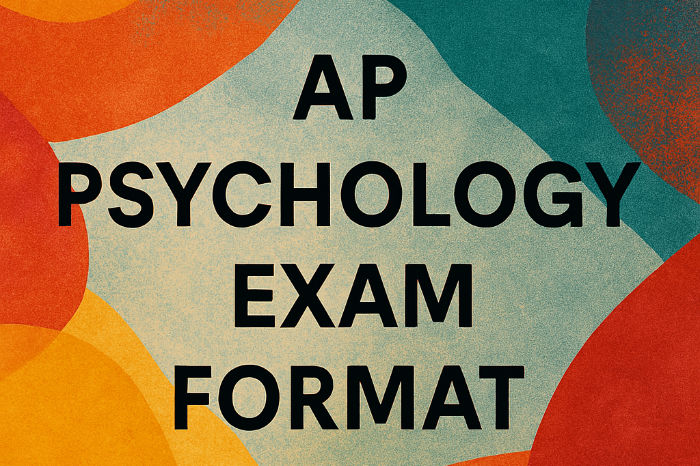AP Psychology Exam Format
Learn about the AP Psychology exam structure, including multiple-choice and free-response sections, timing, scoring, and preparation strategies.

The AP Psychology exam has two sections – multiple-choice and free-response – with a total duration of 2 hours and 40 minutes. Understanding the exam format will help you prepare effectively. Below is a breakdown of the exam's structure, timing, and scoring.
Exam Structure Overview
The AP Psychology exam is divided into two main sections, with a total testing time of 2 hours and 40 minutes:
| Section | Number of Questions | Time | Exam Weight | Format |
|---|---|---|---|---|
| Section I: Multiple-Choice | 75 questions | 1 hour 30 minutes | 67% | Four options per question |
| Section II: Free-Response | 2 questions | 1 hour 10 minutes | 33% | Essay/short-answer format |
Multiple-Choice Section
Section I has 75 multiple-choice questions to answer in 90 minutes. Each question offers four answer choices. These questions cover all major topics of the AP Psychology course, testing both your knowledge of psychological terms and your ability to apply concepts. According to the College Board, multiple-choice questions will ask you to define and explain psychological content and apply skills like concept application, data analysis, and understanding research methods. For example, you might be asked to identify the concept illustrated by a scenario, interpret data from a study, or predict the outcome of an experiment.
Timing Tips: You have 90 minutes for 75 questions, which is about 1.2 minutes per question. Manage your time – if a question is taking too long, skip it and come back later. There's no penalty for guessing, so never leave a question blank. Use process of elimination to narrow down the choices, then pick the best answer. It's wise to practice with timed quizzes or full exams to build speed and confidence.
Free-Response Section
Section II consists of 2 free-response questions (FRQs) to be completed in 70 minutes. This part is worth one-third of your exam score. You will write out answers in essay or short-answer form, demonstrating your ability to explain concepts and analyze scenarios. Each FRQ is scored on a rubric from 0 to 7 points by AP readers.
Question 1 – Article Analysis: The first free-response question gives you a short summary of a psychological study and asks you to analyze it. You may need to identify the study's research method, key variables, and ethical considerations, interpret its results, and discuss what conclusions can be drawn. This FRQ tests your ability to understand and evaluate a research study.
Question 2 – Evidence-Based: The second free-response question provides three brief sources on a psychology topic. Your task is to propose a claim about that topic and support it with evidence from the provided sources and your own knowledge. In other words, use the research findings and relevant psychological concepts to build and justify an argument on the topic.
Free-Response Answer Tips: Read each FRQ prompt carefully and take a moment to plan your answer. Outline the points or terms you need to cover for each part of the question. Then write your response in complete sentences, directly addressing each component of the prompt. Make sure you cover every part of the question – consider labeling parts of your answer (a), (b), (c), etc., to stay organized. Use appropriate terminology and tie your explanations back to the given scenario or study. Try to divide your 70 minutes roughly evenly between the two questions so you have time for both.
Scoring and AP Score Scale
The multiple-choice section accounts for 67% of your score, and the free-response section makes up 33%. Your raw results from each part are combined (with that weighting) to determine your overall exam performance. In simple terms, the number of MC questions you answer correctly and the points you earn on the FRQs are added together to produce a composite score. This composite is then converted to an AP score from 1 to 5. A score of 5 is the highest and indicates you are extremely well qualified in the subject, while a 3 is considered "qualified" or passing for potential college credit. You will only see your final 1–5 score when results are released.
Time Management and Preparation Tips
Practice with Timed Exams: Simulate the test experience by taking practice exams under the same time limits. Use official AP Psychology questions or past exams if available. Timed practice helps you get used to the pacing so you won't run out of time on exam day.
Review Content and Vocabulary: Don't just memorize definitions—make sure you can apply psychological terms and concepts. Create a study schedule to regularly review each unit's key concepts and vocabulary. A strong grasp of the material will benefit you on both multiple-choice and free-response sections.
Start Early, Don't Cram: Spread out your studying over weeks or months instead of cramming at the last minute. Spacing out study sessions helps information stick better. In the final days before the exam, do a light review of important topics and get a good night's sleep. Being well-rested and confident in your preparation will help you stay calm and focused during the test.
By understanding the AP Psychology exam format and following these strategies, you'll be well-equipped to manage your time and perform your best on exam day. Good luck!